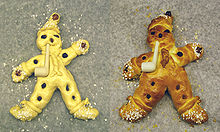Stutenkerl
You can help expand this article with text translated from the corresponding article in German. Click [show] for important translation instructions.
|
 | |
| Type | Pastry |
|---|---|
| Main ingredients | Flour, milk, sugar |

A Stutenkerl belongs to the Saint Nicholas tradition in the German-speaking countries. It is a pastry made of Stuten, sweet leavened dough, in the form of a man (Kerl is German for 'lad' or 'fellow'). Stutenkerle are generally nationally available around Saint Nicholas Day (December 6),[1] but also regionally around Saint Martin's Day in November in parts of the Rhineland.
There are numerous regional names for the Stutenkerl, such as Weckmann (in the west and south west), Kiepenkerl, Klaaskerl, Stutenmann, Hefekerl, Mannele (in North Alsace and Moselle), Mannala (Sud Alsace), Boxemännchen (in Luxembourg), Grittibänz and Grättimaa (Switzerland).[1][2]
The pastry often features raisins in the place of eyes and a clay pipe. The pipe may have to do with the Reformation, to make the originally catholic bishop figure more secular.[citation needed]
See also
[edit]References
[edit]- ^ a b Grittibänz in the online Culinary Heritage of Switzerland database.
- ^ "Hefegebäckmann, Atlas zur deutschen Alltagssprache". Retrieved 2023-01-09.
